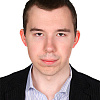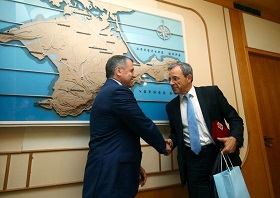On October 29, 2015, Nicolas Sarkozy arrived in Moscow and met Vladimir Putin. He also visited MGIMO (Moscow State Institute of International Relations) where he became Honorary Doctor. “This meeting made it possible to find some common ground and furthered the understanding of each other’s position,” declared the leader of the Republican Party in an interview he gave to one of the French television channels on the same evening in Moscow. There are grounds for believing that this statement is true to life.
On October 29, 2015, Nicolas Sarkozy arrived in Moscow and met Vladimir Putin. He also visited MGIMO (Moscow State Institute of International Relations) where he became Honorary Doctor.
After the first meeting comes dialogue
“This meeting made it possible to find some common ground and furthered the understanding of each other’s position,” declared the leader of the Republican Party in an interview he gave to one of the French television channels on the same evening in Moscow. There are grounds for believing that this statement is true to life. The last cooling in relations between Russia and Europe reduced the number of meetings between the country leaders which basically boiled down to mere negotiations. There is an acute need to find common points regarding the current state of affairs instead of reaching an agreement on specific problems. Being an influential politician remaining uninvolved into executive management posts, N. Sarkozy embodies a perfect envoy from Europe.
Moreover, the ground for this visit was prepared much earlier: in summer 2015, a delegation of the above-mentioned Republicans visited the Crimea. At that time, the unimpressive composition of the delegation and the single-time character of the visit came under criticism. But the first embassy performed its mission: it established rapport between the top brass of both countries. Holding more meaningful discussions (with the country leader himself) fell within the competence of the party leader.
Nevertheless, discord can be observed among the representatives of the center-right party. For instance, another popular politician Alain Juppe called for a “straight talk” with Russia, subject to its activities in the Crimea, South-Eastern Ukraine and in the Middle East. The role of the first collocutor of Russia is contested by N. Sarkozy and ex-Prime Ministers Francois Fillon and Dominique de Villepin. Even in the light of eloquent speeches about our country (“Without Russia we cannot meet the great challenges of this world”), in one of the evening interviews a former president pointed out that he doesn’t see eye to eye with V.V. Putin on all points.
All bets are off?
Based on the results of the recent visit, we can note two observations. First of all, Russia gained really weighty collocutors in the European political quarters. Previously, special emphasis was placed on the Eurosceptic forces, for example, Marine Le Pen. However, there were no high-level meetings, and her praising Russia didn’t draw a response among average Europeans and didn’t get much media coverage. Alliance with the center-right politicians, having good chances to win the elections in 2017, opens wider prospects. Undoubtedly, the countries have already taken a considerable step towards mutual understanding which will become even more meaningful in case the Republicans win the election (for example, N. Sarkozy, provided that he finally opts to stand in elections).
Hence, in the second place, there can be a dramatic change of the whole architecture of European politics starting from 2017. As opposed to sanctions, mutual criticism, total suspiciousness – in case these integral features of relations between Russia and Europe are relevant in the future – there might emerge a fully functional Franco-Russian tandem aimed at the search for an extensive dialogue. The Federal Republic of Germany, whose electoral calendar also stipulates elections to Bundestag in 2017, can make the classic “Moscow-Berlin-Paris” triangle complete.
Consequently, the meeting of the delegation of the main French opposition party in Moscow is quite promising. On the other hand, in order to implement such a scenario all participants still have to travel a long way which will “only” take them two years within which Russia has to meet all diplomatic challenges, while N. Sarkozy’s task is to win the election.





